

Christian Dior and Gucci owners drop super-skinny models. Image copyright Getty Images The fashion houses behind brands including Christian Dior and Gucci have said they will stop using underweight models for their catwalk shows.
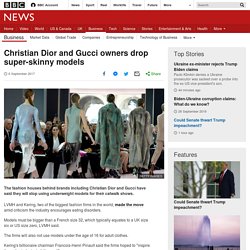
LVMH and Kering, two of the biggest fashion firms in the world, made the move amid criticism the industry encourages eating disorders. Models must be bigger than a French size 32, which typically equates to a UK size six or US size zero, LVMH said. The firms will also not use models under the age of 16 for adult clothes. Kering's billionaire chairman Francois-Henri Pinault said the firms hoped to "inspire the entire industry to follow suit". The two French companies' brands also include Givenchy, Yves Saint Laurent, Alexander McQueen, Marc Jacobs, Thomas Pink, Fendi and Stella McCartney.
France bans ultra-skinny models. Fashion Companies to Stop Working with Very Thin Models. Two of the world's biggest luxury goods companies will stop working with fashion models that are too thin.
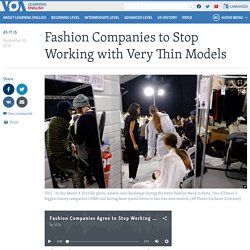
The agreement, signed this week by the French companies LVMH and Kering, seeks to protect the health of fashion models. The agreement will affect well-known brands including Dior, Gucci, Louis Vuitton, Marc Jacobs and others. The companies' agreement meets – and goes beyond – the requirements of a new French law. That law, which will start on October 1, requires male and female models to show health certificates received within the past two years.
LMVH and Kering said their new agreement would shorten that requirement to six months. Fashion Companies to Stop Working with Very Thin Models. Kate Moss criticised over 'skinny is best' motto. Model Kate Moss has been criticised by campaigners after saying she lives by a slogan which encourages people with anorexia not to eat.
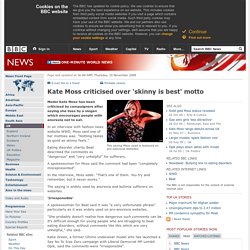
In an interview with fashion news website WWD, Moss said one of her mottoes was: "Nothing tastes as good as skinny feels. " Eating disorder charity Beat described the comments as "dangerous" and "very unhelpful" for sufferers. A spokeswoman for Moss said the comment had been "completely misrepresented". In the interview, Moss adds: "That's one of them. You try and remember, but it never works. " The saying is widely used by anorexia and bulimia sufferers on websites. 'Irresponsible' A spokeswoman for Beat said it was "a very unfortunate phrase" particularly as it was widely used on pro-anorexia websites. "She probably doesn't realise how dangerous such comments can be. Beyond the label: Photographer documents garment industry in Bangladesh.
France bans extremely thin models. Image copyright Getty Images A law in France banning the use of unhealthily thin fashion models has come into effect.
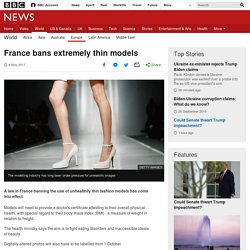
Models will need to provide a doctor's certificate attesting to their overall physical health, with special regard to their body mass index (BMI) - a measure of weight in relation to height. The health ministry says the aim is to fight eating disorders and inaccessible ideals of beauty. Digitally altered photos will also have to be labelled from 1 October. Images where a model's appearance has been manipulated will need to be marked photographie retouchée (English: retouched photograph). A previous version of the bill had suggested a minimum BMI for models, prompting protests from modelling agencies in France. But the final version, backed by MPs 2015, allows doctors to decide whether a model is too thin by taking into account their weight, age, and body shape. Employers breaking the law could face fines of up to 75,000 euros (£63,500; $82,000) and up to six months in jail. Former Vogue editor: The truth about size zero. One of the most controversial aspects of fashion magazines, and the fashion industry, is models.
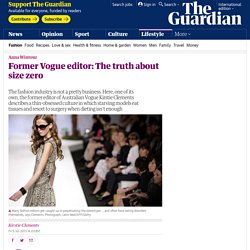
Specifically, how young they are and how thin they are. It's a topic that continues to create endless debate, in the press and in the community. As the editor of Australian Vogue, my opinion was constantly sought on these issues, and the images we produced in the magazine were closely scrutinised. It's a precarious subject, and there are many unpleasant truths beneath the surface that are not discussed or acknowledged publicly. When I first began dealing with models in the late 1980s we were generally drawing from a pool of local girls, who were naturally willowy and slim, had glowing skin, shiny hair and loads of energy. Should We Follow Fashion Or Not? Maybe Not All Of The Fashion Trends - Herald of Fashion. Just the blink of an eye and a trend changes to scoot over and make space for another.
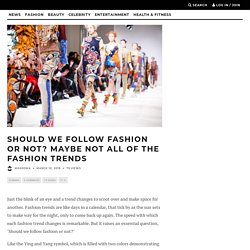
Fashion trends are like days in a calendar, that tick by as the sun sets to make way for the night, only to come back up again. The speed with which each fashion trend changes is remarkable. But it raises an essential question, ‘Should we follow fashion or not?’ Like the Ying and Yang symbol, which is filled with two colors demonstrating two answers, the answer to this question is also equally divided between the affirmative as well as the negative. However, the answer slightly inclines in the favor of ‘no.’ Should We Follow Fashion Or Not? Nobody wants to look like a multicolored zebra amidst a zeal of black and white striped zebras. Size-zero ban is proof fashion industry is finally listening to customers. The use of size zero models has been a fashion industry scandal for 15 years.
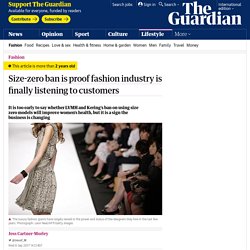
The announcement that rival Paris powerhouses LVMH and Kering have joined forces to end the practice is proof of an industry finally being held to account by the clothes-buying public. Will their charter succeed in improving model health, after previous initiatives failed? It is too early to say. But the move is encouraging evidence of how fashion is being gradually democratised. Social media has provided a platform for less powerful industry players – models, and consumer critics – who were effectively locked out of an elitist world in which designers dictated how women should look but accepted no accountability for the physical demands placed by a 23in waistband. But there is more to unpick here about fashion’s internal power balance.
Talented, dependable, down-to-earth design studio veterans are now first in line for the top jobs, not eccentrics and mavericks. Should we follow fashion? Should we follow fashion?